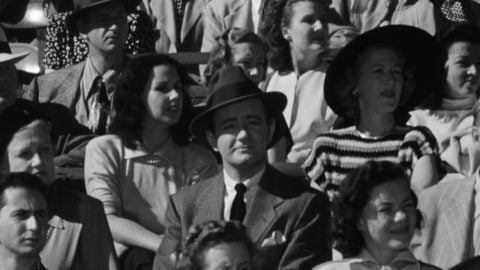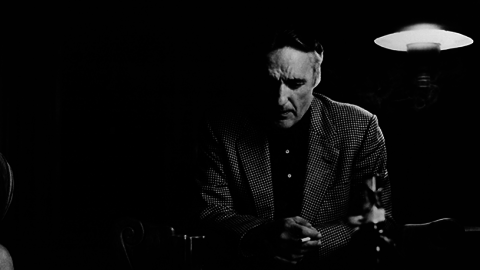Bruno Ganz, Mischievous Angel
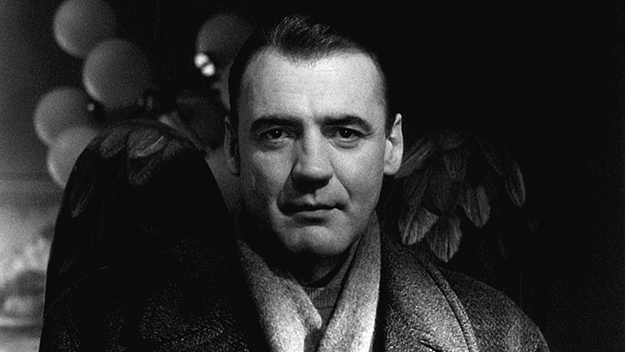
Wings of Desire (Wim Wenders, 1987)
“It’s wonderful to live as spirit and testify for all eternity to only what is spiritual in people’s minds,” Damiel (Bruno Ganz) tells fellow angel Cassiel (Otto Sander), the two overcoated chroniclers of human affairs, invisible to their earthbound subjects, perched in the front seat of a showroom automobile. Yet sometimes Damiel longs to know the burden of mortal transience. “I want to enter the history of the world,” he’ll later declare. “Or even just hold an apple in my hand.”
Who but Ganz, with his singular, inimitable gift for conveying ambivalence, could have embodied Damiel’s journey from ethereal therapist to earthly bon vivant with such brio? That the great Swiss actor has left this world and thus reversed Damiel’s trajectory makes revisiting Wings of Desire (1987), Wim Wenders’ spellbinding meditation on Berlin, the sacredness of our inner lives and the yearning for ordinary pleasures, all feel that much more poignant.
As Damiel, Ganz at once offers phantom counsel—the scene where he lays his hands on the cranium of a dying accident victim is very touching—and commits a peculiar violation. Watching Damiel enter the trailer of Marion (Solveig Dommartin), the French trapeze artist who becomes the catalyst for his transition, it’s hard not to think of Dracula (Klaus Kinski) entering the boudoir of Lucy (Isabelle Adjani), the wife of Ganz’s character in Werner Herzog’s Nosferatu the Vampire (1979). This is as it should be: you didn’t cast Ganz to be an angel; rather, you cast him to infuse a character, no matter how tainted or innocent, with potentially transgressive impulses that only the camera can register. And you cast Ganz to listen, which is Damiel’s vocation. Listening is the most undervalued component of acting—screen acting most especially—yet Ganz often devoted the bulk of his energy to it, captivating us with his attention while his showier scene-mates claimed the limelight.
After Damiel “takes the plunge” and becomes flesh and blood some two-thirds into Wings of Desire, the visual palette switches from black and white—the angel’s lens—to color, and Damiel, previously a spectral, slightly waxen matinee idol, now has blue eyes, crow’s feet and endearingly bad fashion sense. Only after the angel falls are we finally treated to the full Bruno, a man who lives as though every moment’s a reprieve from the gallows.
Ganz’s mother was Italian; his father, a factory worker, was Swiss. He grew up working-class in the outskirts of Zürich, and though not ideally situated for immersion in the arts, he befriended a lighting technician who got him into the theater for free. Ganz was hooked, and began acting professionally at 17.
For the first decade and a half of his career Ganz worked steadily as a stage actor. He starred in the world premiere of Thomas Bernhard’s Der Ignorant und der Wahnsinnige and co-founded the Berliner Schaubühne ensemble with theater legend Peter Stein, a commitment that prevented Ganz from accepting Wenders’ invitation to join Kings of the Road. By the mid-’70s Ganz had done some television and just a handful of movies, the best of which merely hinted at his potential. In Éric Rohmer’s beautiful period film The Marquise of O (1976) Ganz was hemmed in by decorum and, in retrospect, cast against type as a morose, pushy Russian count. But the role seized on Ganz’s ability to convey inner turmoil and a secret capacity for savagery—qualities that would come to full fruition in The American Friend (1977), Wenders’s odd and ingenious adaptation of Patricia Highsmith’s Ripley’s Game, and Ganz’s breakthrough.
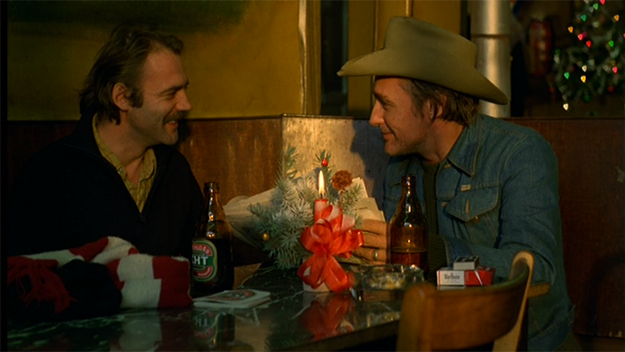
The American Friend (Wim Wenders, 1977)
Jonathan Zimmerman (Ganz) is a Swiss picture framer living in Hamburg with his wife and young son. He runs a little shop near the waterfront. We see him in his toque and striped scarf, fists stuffed in pockets, someone who’s worked hard to construct a simple, noble life. Yet, whether due to circumstance or some innate dissatisfaction, he nurtures a simmering resentment that belies his avuncular nature, a resentment that manifests in his refusal to shake hands with American art dealer Tom Ripley (Dennis Hopper), as well as in private moments where he gloomily sings along to the Kinks’ “Too Much on My Mind” with his head in a frame. Ganz endows Jonathan with a strange loneliness that can’t be assuaged by a spouse or child but, perhaps, by some primal bond forged in violence with another man.
With his receding hairline and generous mustache, Ganz, by this point in his mid-30s, comfortably inhabited that liminal zone between youth and middle-age. (Ganz’s sloping profile and wide-set, slightly protuberant eyes, anticipates the physiognomy of Javier Bardem, another talented actor of indeterminate age and origin. But where Bardem nearly always projects impishness or devilry, Ganz transmitted anxieties in a manner so subtle as to seem invisible.) Ganz’s look and demeanor were an ideal match for his character’s position as a self-made businessman with deteriorating health. The stoic Jonathan has a rare blood disease he seems eager to ignore—while the film’s underworld antagonists seem eager to exploit it, conning Jonathan into committing crimes for them in exchange for bunko medical consultations. As the antihero of this existential thriller and melancholy study of male friendship, Ganz holds our sympathy even after surrendering himself to aberrant acts. He performs his duties sleepily, as though in a dream, as though he himself is not entirely convinced that chance has transformed him into a murderer.
The meticulous Ganz didn’t initially get on with Hopper, who arrived fresh from filming Apocalypse Now, stoned out of his gourd and unable to memorize a line of dialogue. But the actors eventually found a middle way of collaborating that allowed each to draw upon the other’s strengths and sensibilities—Hopper would later claim Ganz saved him from suicide. (Where The American Friend brought out the best in both Ganz and Hopper, Nosferatu largely left Ganz in the position of playing straight man to Kinski, who gave his most affecting performance as the wounded predator of the title.) Ganz became an international star, one who infused every project with a distinct mystery and authenticity. He’d eventually work with such luminaries as Francis Ford Copolla, Jonathan Demme, Sally Potter, and Theo Angelopoulos.
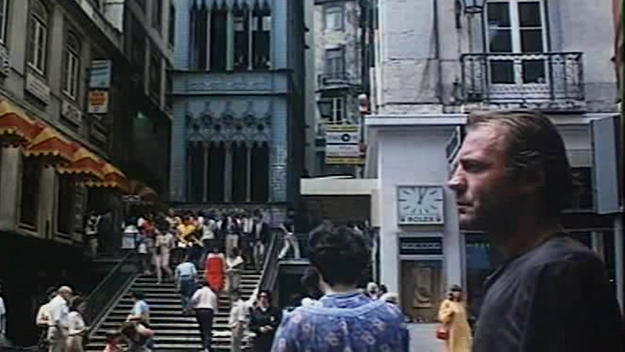
In the White City (Alain Tanner, 1983)
Though he spent his life performing, Ganz was that rare actor who could be convincing as a laborer—and as someone who might walk away from everything at a moment’s notice. One of Ganz’s finest and most woefully underappreciated performances is in Alain Tanner’s In the White City (1983), a haunting character study that reveals precious little about its central character. Ganz plays Paul, a merchant seaman who disembarks his tanker in Lisbon and neglects to return when the ship leaves port. With little to his name save a portable cassette player, a harmonica and the Super-8 camera he uses to capture impressions of his journeys, Paul takes up residence in a budget hotel, wanders the city, begins an affair with a chambermaid, and gets into trouble. What’s he up to? He’s not the sort to go searching for himself, and is anyway too old for such caprices. In the White City is sparing with dialogue and Paul doesn’t articulate his motives.
Again, Ganz the conjuror of ambivalence: Paul revels in the anonymity and freedom granted him from having shaken loose his established life, yet he refuses to completely cut ties. He sends his Super-8 reels back to Switzerland, where a waiting woman faithfully develops and watches them, even when their content is hurtful. There is in Ganz’s Paul a certain model—a deeply flawed model—of masculine self-actualization. It’s only in writing this piece that I realize how much Ganz, and especially Ganz-as-Paul, reminds me of my father, who also used his work as a merchant seaman as a means to leave his wife and country and start anew in a strange land; who also possesses an amiable exterior that veils an inner dissatisfaction; who also seems capable of straying from his ostensible principles.
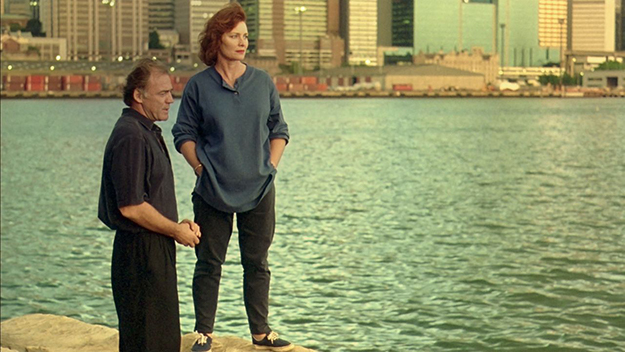
The Last Days of Chez Nous (Gillian Armstrong, 1992)
By his fifties, with the romance of Wings of Desire and the desolation of In the White City under his belt, with an increasingly craggy face and a Peter Sellers accent, Ganz had become a delightfully unlikely sex symbol. In Gillian Armstrong’s The Last Days of Chez Nous (1992) he played Jean-Pierre, a Frenchman who somehow found himself in Australia, in a marriage eroding from neglect, clashing temperaments and a hopeless vision of free love. Written by novelist Helen Garner, the film brims with a wisdom and emotional complexity that’s never quite matched by its exposition-heavy scenario and character development. But Ganz and co-star Lisa Harrow give passionate, lived-in, textured performances that reward repeat viewings.
Old age had rendered Ganz only more versatile, an instrument that could slide from wizened patience to gnarled fury. In his final decades he was summoned as a shortcut to historical gravity. In Downfall (2004), a film with a dubious sense of purpose, he played a palsied, pasty yet colossally vain Hitler who, whether in moments of intimate affection or sputtering, hysterical ranting, seemed to be always delivering a performance. He played a Holocaust survivor in The Reader (2008), while in Remember (2015), one of Atom Egoyan’s best recent films, he has a cameo as an unrepentant former Nazi who’d soldiered under Rommel. In The Baader Meinhof Complex (2008) Ganz played one of his historical contemporaries, Horst Herold, President of Germany’s Federal Criminal Police, the hero who apprehends the terrorists because he understands them better. And in Lars von Trier’s The House That Jack Built (2018) he was interlocutor and ersatz Virgil to a murderous sociopath—again, Ganz could really listen. He also maintained a vibrant stage career, re-teaming with Stein for a lauded production of Goethe’s Faust. Among his many honors, Ganz was awarded the centuries-old, diamond-studded Iffland Ring, given to the greatest German-speaking theater actor of a generation and re-awarded only at the time of the current bearer’s death. More recently, Asteroid 199900 Brunoganz was named in his honor.
But it was one of Ganz’s performances in a substantially less august recent project that came to mind when I heard of his death. Directed by Jaume Collet-Serra and set in Berlin, Unknown (2011) is a flamboyantly risible amnesiac thriller and vehicle for Liam Neeson’s late-career reinvention as action antihero. Ganz plays Ernst Jürgen, a private detective and former Stasi operative. His most memorable scene is also his last: a beautifully measured duet that constitutes the film’s peak of elegance by a very wide margin. Jürgen is visited by Rodney Cole (Frank Langella, exuding sinister grace), an American mercenary. The men exchange niceties but Jürgen knows his number’s up. Rather than allow Cole to murder him, Jürgen calmly doses himself with cyanide, and the two aging Cold Warriors close their encounter in a blood embrace that’s almost tender. “He died very well,” Cole will later attest. Even in a supporting role that required little of him, Ganz always delivered, exuding the gravitas of someone who knew what it meant to live very well.
José Teodoro is a freelance critic and playwright.




